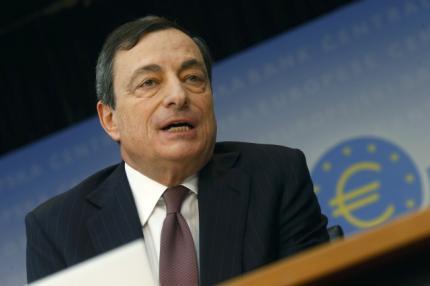ECB seen on hold as inflation picks up, QE a way off
Liquidity measures seen more likely but markets sceptical

Liquidity measures seen more likely but markets sceptical
Bareksa.com - The European Central Bank will likely hold off policy action on Thursday, waiting for new forecasts from its staff in June before deciding whether to counter low inflation that ticked up last month.
The ECB Governing Council meets in Brussels against the backdrop of a Franco-German spat over ECB policy towards the euro's exchange rate - one factor the bank's president, Mario Draghi, has identified as a potential trigger for policy action.
Ahead of the meeting, markets pushed the euro above $1.39 and towards its high for this year after surveys showed euro zone firms enjoyed a brisk start to the second quarter.
Promo Terbaru di Bareksa
Last month, Draghi outlined scenarios that could prompt ECB action: a de facto tightening of monetary policy caused by market moves like further euro gains, fresh trouble transmitting ECB policy to all parts of the euro zone, or a deterioration of the inflation outlook.
None of the scenarios appears to have materialised to a sufficient degree yet to prompt ECB action.
The euro rise has so far stopped short of $1.40, the mark a Reuters poll of economists suggested would prompt ECB action, banks expect to ease credit standards to firms in the second quarter and inflation rose to 0.7 percent in April from March's 0.5.
"I see a 20 percent chance that they surprise us with a rate cut," Nordea analyst Holger Sandte said of Thursday's meeting.
A Reuters poll published on Friday showed euro zone monetary policy is likely to remain steady well into the future as a more broad-based recovery takes hold while inflation has probably already fallen as low as it will go.
With inflation running well below its medium-term target of just under 2 percent, the ECB has nonetheless faced calls from French politicians and the International Monetary Fund, as well as the OECD, to do more to buoy the euro zone economy.
The Paris-based Organisation for Economic Cooperation and Development (OECD) urged the bank on Tuesday to cut its main interest rate to zero and keep it there for at least 18 months to counter persistently low inflation.
Germany said the level of the euro was an issue for the ECB but not politicians, indirectly criticising French Prime Minister Manuel Valls after he said the currency was "too high" and that a "more appropriate" monetary policy was needed to bring it down.
Markets are looking for any sign the ECB could embark on U.S.-style quantitative easing (QE) - central-bank speak for money printing to buy assets. They are likely to be waiting for some time.
Draghi raised the idea in an April 24 speech of a "broad-based asset purchase programme" if the inflation outlook worsens. But just a few days later - at a meeting with German lawmakers - he played down the prospect of QE any time soon.
The ECB chief did see "a problem of ongoing low inflation rates, which could lead to measures", a source who attended the meeting said, adding: "He mentioned quantitative easing in this context but made clear that we're still some way off QE."
DIFFERENT BALLGAME
While the ECB is far from embarking on a broad asset-buying plan, it is closer to readying a targeted funding operation that would seek to encourage banks to lend to small and medium-size businesses, or SMEs.
Such an operation could see the ECB offer banks cheap, long-term loans, or LTROs, in return for collateral in the form of bundled loans to SMEs - a ploy that would aim to support the market for SME loans packaged as asset-backed securities (ABS).
If banks responded to the offer, such a measure could give the smaller companies that form the backbone of the euro zone economy better access to credit and allow ECB policy rates to filter through to them more efficiently.
The ECB supplied banks with over 1 trillion euros ($1.4 trillion) in 3-year LTROs in late 2011 and early 2012, as the euro zone crisis was choked lenders.
A targeted LTRO would lack the size, scale and impact of a major asset-buying plan, and some analysts doubt whether it would do much to address the low inflation gripping the euro zone now.
"The LTROs were very helpful at the time. Liquidity was needed in the financial system," said Klaus Wiener, head of tactical asset allocation and chief economist at Generali Investments Europe, which manages $500 billion.
"But I think when it comes to really making a difference for inflation and inflation expectations, I think it is more QE that matters," he said. "I think it is a different ballgame now."
No ECB action this month would stoke market anticipation of updated forecasts from the bank's staff, stretching through to 2016, which it will publish after its June 5 meeting.
A downward revision of the inflation forecasts then would put renewed pressure on the ECB to act, while an upward revision would relieve some pressure. ($1 = 0.7205 Euros)
(Source : Reuters)
Pilihan Investasi di Bareksa
Klik produk untuk lihat lebih detail.
| Produk Eksklusif | Harga/Unit | 1 Bulan | 6 Bulan | YTD | 1 Tahun | 3 Tahun | 5 Tahun |
|---|---|---|---|---|---|---|---|
Trimegah Dana Tetap Syariah Kelas A | 1.384,88 | ||||||
Trimegah Dana Obligasi Nusantara | 1.095,38 | - | |||||
STAR Stable Amanah Sukuk autodebet | 1.084,98 | - | - | ||||
Capital Fixed Income Fund autodebet | 1.853,59 | ||||||
Insight Renewable Energy Fund | 2.287,69 |

Produk Belum Tersedia
Ayo daftar Bareksa SBN sekarang untuk bertransaksi ketika periode pembelian dibuka.

Produk Belum Tersedia
Ayo daftar Bareksa SBN sekarang untuk bertransaksi ketika periode pembelian dibuka.